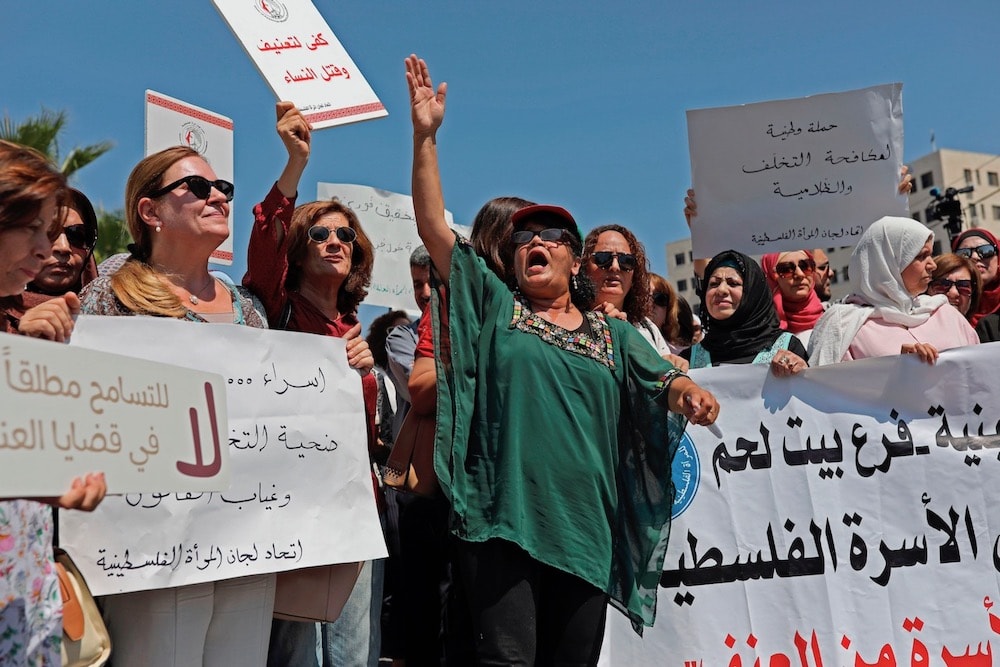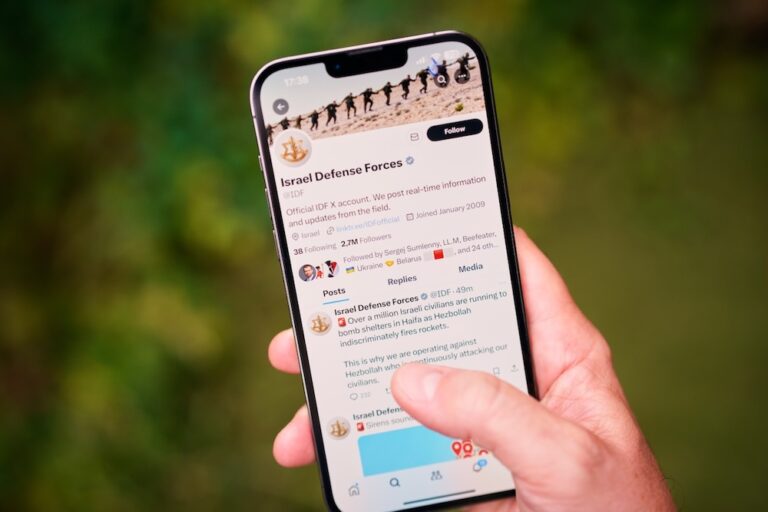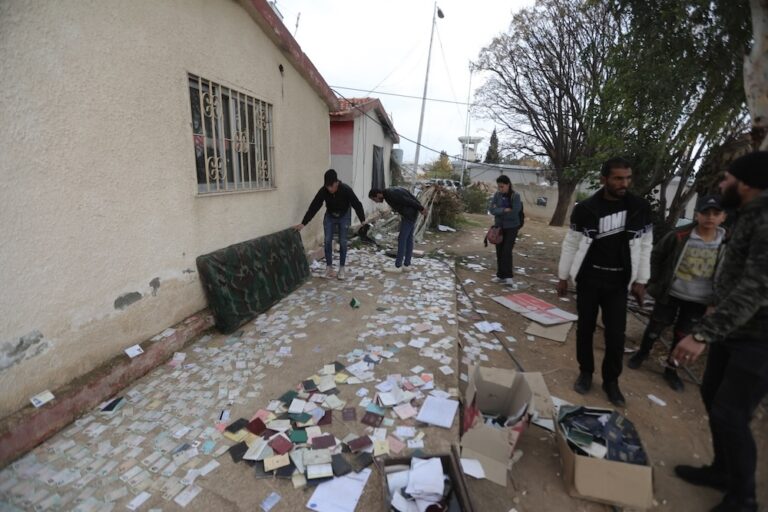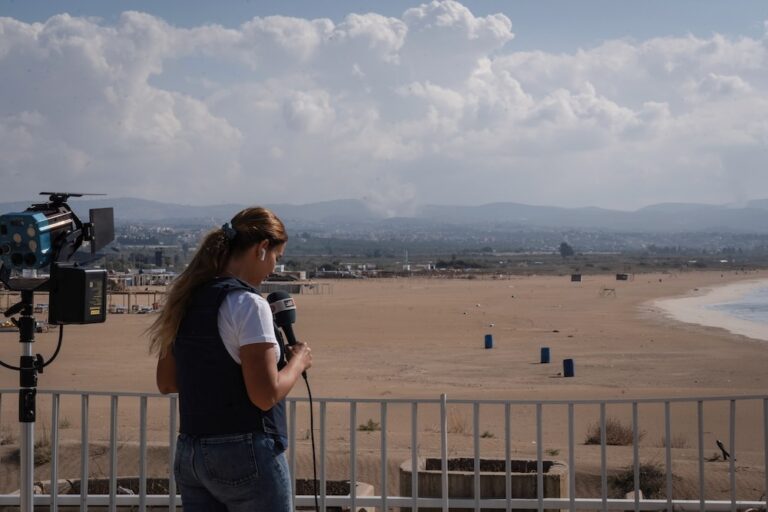February 2023 in Middle East and North Africa: A special feature on how Palestinian civil society is countering online gendered violence, plus the latest free expression news from the region, produced by IFEX's Regional Editor Naseem Tarawnah.
7amleh’s Mona Shtaya on civil society efforts to counter online gender-based violence in Palestine. Escalating crackdown on free expression in Tunisia and Morocco. And justice for Syrian war victims progresses.
Battling gender-based violence in the Palestinian online civic space: a Q&A with 7amleh’s Mona Shtaya
Digital technology has emerged as a game-changer for human rights and traditionally marginalised voices in the Israeli-Palestinian conflict, particularly those of Palestinian women. However, as the online gender gap narrows with more women online, digital space has also become a battleground for surveillance and harassment.
On the frontlines of promoting a safer, more equitable digital space for Palestinian women is IFEX member, the Arab Center for the Advancement of Social Media (7amleh). In an interview conducted via email, Mona Shtaya, 7amleh’s Advocacy & Communications Officer, discusses civil society efforts to counter online gender-based violence (GBV), emphasising the critical need for effective measures to safeguard the rights of Palestinian women and girls in digital spaces.
How do gender, political conflict, and digital rights intersect to affect Palestinian women’s online experiences?
We cannot see the struggle for women’s rights in isolation from the struggle for human rights in general and for political rights and freedoms. In complex political contexts such as the situation in Palestine, women and LGBTQI+ communities are subjected to multilayered censorship due to the political situation and conservative societies.
“In our recent report, 50% of Palestinian women indicated their constant feeling of being surveilled through social networks. Furthermore, one out of four women has been subjected to misogynistic comments or harassment, including mocking and degradation, just for being women.”
How have local laws perpetuated the status quo for women’s rights in the digital sphere, and how is civil society contesting these laws?
The local laws don’t provide sufficient protection for women. For example Palestine lacks legislation to protect privacy and personal data. As a result, the personal information of female activists, journalists, and human rights defenders may be published to pressure and threaten them, compromising their fundamental rights.
Authorities encourage women to report cases of blackmail under an existing cybercrime law but its vague terms and definitions may be used to restrict women’s freedom of expression. Moreover, the law doesn’t protect them from hate speech and incitement.
Our organisation supports civil society to monitor and document online GBV, and advocate for improved legislation that ensures a free, safe, and fair digital space for everyone.
How does civil society tackle online GBV in Palestine, and what’s the role of monitoring and reporting mechanisms?
One of the most important things we do is conduct awareness campaigns to educate people about online GBV and hate speech against women. We also work with tech companies and escalate online GBV reports to social media platforms – monitoring and documenting cases through 7or, the first Palestinian digital rights observatory – and urge them to take strict measures to protect women in online spaces.
We also research online GBV regularly to provide credible reports for other civil society organisations. In the Palestinian context, monitoring and reporting mechanisms play a crucial role in documenting and addressing online GBV incidents and advocating for policy changes to ensure a safer and more inclusive online space for everyone.
How can social media companies enhance their role in combating online GBV targeting Palestinians?
Tech companies receive our reports of content that targets or harasses women, and take measures to protect them by removing any such content that violates their community standards. Previously, Meta adopted a raising awareness video produced by 7amleh, adding it to their Safety Center to encourage women to report online GVB.
However, social media companies can do much more, including making sure content moderation policies are more inclusive and being more responsive to our reports, since women’s lives might be at risk if they aren’t responsive quickly enough.
How does 7amleh collaborate with civil society groups to address online GBV?
We partner with feminist organisations to support them whenever they face attacks or witness dramatic issues happening on the ground. Typically, we collaborate in monitoring, documenting and researching online GBV to better understand the challenges faced.
We help coordinate meetings between these groups and social media companies to engage them in the policy-making process and provide a space to express their concerns regarding Big Tech’s policies.
How is accessibility addressed to ensure women in public life have privacy and security tools to defend against online GBV?
Palestinians in general are living under a state of surveillance which undermines our digital rights, including our right to privacy and free speech. However, women are more threatened, since we live in a patriarchal society and the chain of violence puts women under an extra layer of censorship.
One example: A few years ago we published a study about CCTV cameras in Jerusalem and one woman described how she felt compelled to wear the hijab head covering inside her home – her safe space – as a result of CCTV cameras directed at her house, invading her privacy. Life under surveillance changed her behaviour.
What advocacy efforts should be prioritised in addressing online GBV?
GBV already pushes women out of digital spaces. Our previous research found one in four Palestinian women are leaving the digital space because of online GBV and harassment.
If we don’t act quickly, there’s a risk misogynistic online spaces will become even more prevalent. We need to focus on developing policies that promote safe and inclusive online spaces, and launching awareness campaigns to promote social change.
Stay informed: Visit IFEX’s Gender and Sexual Diversity hub page.
February: The MENA Region in Brief
New & Noteworthy
Visualizing Palestine’s “System of Silencing” is the first of five visuals by highlighting attacks on Palestinian freedom of expression aimed at shielding Israel from accountability. Over the next few months, VP will delve deeper into several of the tactics featured in the visual.
A new report by civil society groups examines online disinformation and hate speech trends in several countries in the region last year. The research highlights the prevalence of online gender-based violence, with women active in the public sphere being particularly targeted during times of elections and crises.
‘Terrorists, traitors and plots’: Clampdown on free expression in Tunisia and Morocco intensifies
Rights groups have raised alarms about an escalating crackdown on free expression in Tunisia, as a recent wave of repression saw authorities arrest judges, businessmen, activists, and at least a dozen political opponents critical of President Kais Saied. Senior figures in the National Salvation Front, including Jawher Ben Mbarek and Noureddine Bhiri, are among those targeted.
The media has also come under attack. RSF reported that police raided the premises of the news website OneTN, arresting several journalists and seizing equipment. Journalist and director general of Radio Mosaïque FM, Noureddine Boutar was also arrested during a raid on the eve of World Radio Day on 13 February and questioned about the radio station’s editorial line. His arrest was condemned by Mohamed Jlassi, president of the National Union of Tunisian Journalists (SNJT), who called it “an attempt by authorities to control the media, to impose a climate of fear.” Jlassi himself is also facing prosecution after a police complaint accused him of inciting disobedience against police officers during a protest last year.
During a televised speech, President Saied accused those arrested of being “terrorists and traitors” and warned that anyone who defended them would be considered their accomplice. Additionally, the EU’s top trade union official, Esther Lynch was expelled from the country and accused of interfering in Tunisia’s domestic affairs after speaking at a Tunisian General Labour Union (UGTT) protest.
Thousands attended the union-led demonstrations in Sfax and several other cities across the country, denouncing Said’s policies stifling union rights, including the arrest of UGTT official Anis Kaabi during a 31 January strike by toll booth workers.
Tunisian civil society groups and the African Union also condemned President Saeid’s anti-immigrant rhetoric, where he alleged a plot to change Tunisia’s demographics by settling immigrants from sub-Saharan countries. Saied’s statements have sparked mounting violence against Sub-Saharan African migrants.
Meanwhile in Morocco, rights groups called on authorities to uphold freedom of expression and release unjustly imprisoned journalists, including Taoufik Bouachrine. Founder and editor-in-chief of independent daily Akhbar Al-Youm, Bouachrine was sentenced to 12 years in prison in 2018 for alleged sexual assault against several women, a charge he denies. False allegations of sexual assault and extramarital relations are routinely used by Moroccan authorities to imprison critical journalists and damage their reputations.
The European parliament recently adopted a resolution urging Morocco to “respect freedom of expression and media freedom” and provide a fair trial to Bouachrine, as well as journalists Omar Radi and Soulaimane Raissouni, who were also sentenced on sexual assault charges. While the resolution was condemned by Morocco’s parliament, Reporters Without Borders (RSF) hailed it as an end to “25 years of passivity” toward declining press freedoms.
The EU’s prolonged silence on press freedom in Morocco may be due in part to recent revelations of a bribery scheme involving EU lawmakers that has shaken the institution’s credibility. Morocco and Qatar are accused of using cash and gifts to buy influence with EU officials. Italian MEP Andrea Cozzolino was arrested on corruption charges, revealing efforts to position her on a parliamentary committee investigating Morocco’s use of Pegasus spyware to target journalists, activists, and even the Spanish government.
Also noted…
Iraq: Critics warn a new government platform for reporting social media content that “violates public morals, contains negative and indecent messages, and undermines social stability” could infringe on the right to free expression. In February, the Ministry of Interior announced it received 96,000 reports of “indecent content” via its “Ballegh” platform, amidst a crackdown of Iraq’s online space that has resulted in several arrests.
Egypt: IFEX member, the Cairo Institute for Human Rights Studies (CIHRS) had its website attacked and then blocked by the Egyptian authorities hours after the publication of a joint-report submitted to the United Nations Human Rights Council as part of Egypt’s mid-term Universal Periodic Review (UPR) process. The censorship of the CIHRS website is just one of the latest acts of reprisal committed by Egyptian authorities against human rights defenders and organisations for their cooperation with international human rights mechanisms.
Yemen: UN human rights experts sent a letter to the Houthis – the de facto authority in most of Yemen – detailing their systematic violations of women’s and girls’ rights in the country, including restrictions on freedom of movement, expression, health, and work, and discrimination. The experts called for an end to the Houthis’ increasingly oppressive treatment of women, which includes requiring a male guardian’s approval for travel and impeding access to healthcare, with female staff unable to travel to field locations without a guardian, leaving many female-headed households without crucial aid.
Syria: In good news, a German court delivered a significant blow to impunity for war crimes in Syria by sentencing a Palestinian-Syrian man to life in prison for a 2014 attack that killed four people in the Yarmouk district of Damascus. The verdict was welcomed by the Syrian Center for Media and Freedom of Expression (SCM), which has been pushing for justice and redress for victims of grave violations in Syria since 2011.
This marks the third case in Germany where a verdict has been issued based on the principle of universal jurisdiction, allowing for the prosecution of Syrian suspects accused of war crimes and crimes against humanity in Syria.



